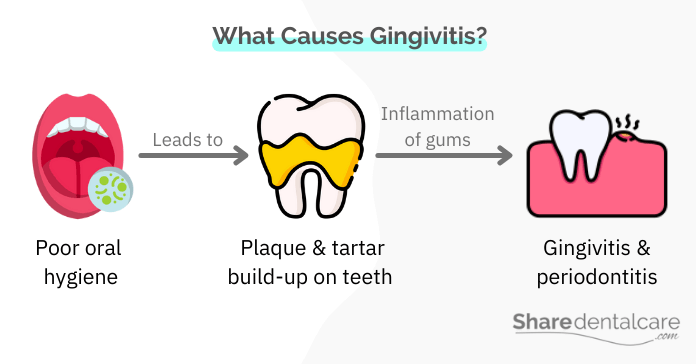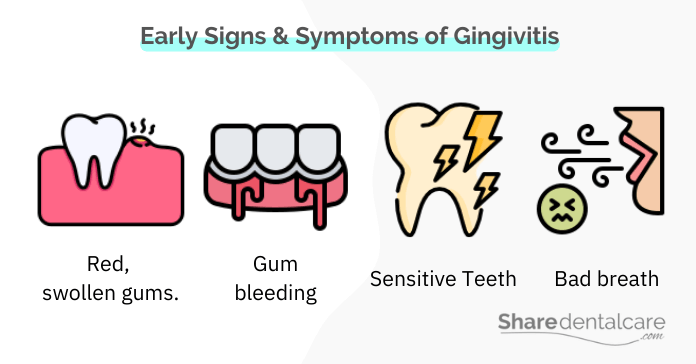Gingivitis is an oral infection that can lead to oral and overall health problems if left untreated. It is common among adults over age 30. However, most people are unaware that they have gingivitis until it is too late because the early symptoms are often ignored. So, it is important to be aware of these early warnings to begin the treatment before the condition worsens. In this article, you will learn about the early symptoms of gingivitis and how you can treat it early before the condition turns into periodontitis.
What is Gingivitis?
Gingivitis is the mild form and start of gum disease that is caused by a bacterial infection. It occurs due to the accumulation of dental plaque and food debris on teeth and gums. Plaque contains bacteria that irritate your gums, leading to gingivitis. If gingivitis is left untreated, It can lead to periodontitis, which is a severe form of gum disease. Periodontitis affects the tooth-supporting tissues and can lead to tooth loss.
According to the Centers for Disease Control and Prevention, gum disease affects about 47.2% of adults over age 30. Most people have gingivitis, but they are not aware of it because early symptoms are often ignored. So, it is important to identify the early symptoms and treat them properly before gingivitis progresses into periodontitis. Learn more about the differences between gingivitis vs periodontitis.

Causes & Risk Factors
Gingivitis is usually caused by the buildup of plaque on your teeth. Plaque contains bacteria that irritate your gums and lead to early symptoms of gingivitis. If you don’t take care of it early, it will eventually progress into periodontitis. Several risk factors can increase your chances of developing gingivitis, including:
- Poor oral hygiene.
- Smoking cigarettes or using tobacco products. Learn more about the link between smoking and gum disease.
- Hormonal changes during pregnancy (pregnancy gingivitis), puberty, and menopause.
- Dry mouth condition (xerostomia).
- Poor diet & vitamin C deficiency.
- Taking some medications, such as anticonvulsants and steroids.
- Chronic medical conditions, like diabetes and HIV/AIDS.
Early Signs & Symptoms of Gingivitis
The early signs and symptoms of gingivitis are often ignored because it does not cause pain. The early signs and symptoms include:
- Red, swollen gums.
- Gum bleeding, especially after brushing, flossing, or when eating certain foods.
- Tender gums.
- Bad odor from your breath.
- Mild gum recession, which may cause sensitive teeth.
Learn more about the differences between gingivitis vs healthy gums.

Symptoms from Early Gingivitis To Severe Periodontitis
It is important to identify the early signs & symptoms to treat gingivitis before it progresses into periodontitis, a more severe form of gum disease. The signs and symptoms of periodontitis, include:
- Pain when chewing foods and talking.
- Moderate or severe gum recession, teeth will appear longer than usual.
- Periodontal pockets.
- Gum abscess.
- Sensitivity to hot and cold foods, or even slight pressure on your teeth.
- Change in bite due to loosening of teeth and changes in alveolar bone height.
- Persistent bad breath.
- Tooth loss.
What to Do if You Spot the Early Symptoms of Gingivitis?
If you have spotted early signs & symptoms of gingivitis, then it is crucial to take action and seek treatment as early as possible. Gingivitis can be easily reversed by professional teeth cleaning and home remedies.
Professional Teeth cleaning
The treatment of gingivitis includes professional teeth cleaning to get rid of plaque and tartar. This can help reduce bacteria that cause gum disease. Most dentists recommend regular checkups every 3 months or at least twice a year to clean your teeth and detect early symptoms of gingivitis.
Home Remedies
- Brush teeth regularly with a soft toothbrush and fluoride toothpaste.
- Floss between teeth daily to get rid of trapped food particles and bacteria on tooth surfaces.
- Eat healthy foods that help prevent plaque formation.
- Drink lots of water to keep your mouth moist.
- Chew sugarless gum after every meal, especially at night to stimulate saliva production to wash away food particles.
- Use mouthwashes to freshen your breath and kill bacteria in the mouth.
Early Symptoms of Gingivitis – Conclusion
It is important to identify early signs and symptoms of gingivitis, which can be reversed with professional teeth cleaning or home remedies. The early signs and symptoms are often ignored because they do not cause pain, but it’s important to identify them early on before gingivitis progresses into periodontitis. Early on, most people will experience red swollen gums that are bleeding after brushing or eating certain foods; if left untreated for too long, it may result in tooth loss.